Coca-Cola
Coca-Cola To Launch Line Of Flavored Sparkling Waters Next March
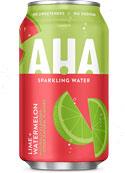
Coca-Cola North America will enter the high-growth flavored sparkling water market next March with the debut of Aha in eight flavors – two years after PepsiCo launched its Bubly line. According to Coca-Cola executives, Aha will replace five-year-old Dasani Sparkling at retailers. The products will be available in multipacks of 12-ounce cans and in 16-ounce individual cans in lime + watermelon, strawberry + cucumber, citrus + green tea, black cherry + coffee, orange + grapefruit, apple + ginger, blueberry + pomegranate, and peach + honey flavors. All will be calorie- and sodium-free. Nielsen data show retail sales of Coca-Cola’s sparkling water portfolio – including Smartwater Sparkling and Dasani Sparkling – grew 27 percent in 2018. The launch of Aha will be the first major brand introduction by the company since 2006.[Image Credit: © The Coca-Cola Company]
Australia’s Coke Bottlers Now Use 100 Percent Recycled Plastic Packaging
 Coca-Cola Australia and Coca-Cola Amatil announced that all Coca-Cola soft drink brands (600 ml and below) – including Coca-Cola, Sprite, and Fanta – and all water brands (600 ml and below) – including Mount Franklin and Pump – in Australia are now being produced in 100 percent recycled plastic bottles. Coca-Cola Amatil announced earlier this year that it will make seven out of 10 plastic bottles from 100 percent recycled plastic by the end of 2019. Coca-Cola’s juice and dairy brands are transitioning toward that goal before the end of the year. In addition, Coca-Cola Australia has ramped up its efforts to promote recycling to all Australians.[Image Credit: © Coca-Cola Amatil Limited]
Coca-Cola Australia and Coca-Cola Amatil announced that all Coca-Cola soft drink brands (600 ml and below) – including Coca-Cola, Sprite, and Fanta – and all water brands (600 ml and below) – including Mount Franklin and Pump – in Australia are now being produced in 100 percent recycled plastic bottles. Coca-Cola Amatil announced earlier this year that it will make seven out of 10 plastic bottles from 100 percent recycled plastic by the end of 2019. Coca-Cola’s juice and dairy brands are transitioning toward that goal before the end of the year. In addition, Coca-Cola Australia has ramped up its efforts to promote recycling to all Australians.[Image Credit: © Coca-Cola Amatil Limited]
Danone
Danone Waters To Distribute Italian Mineral Water Brand Ferrarelle In U.S.
Keurig Dr Pepper
Keurig Dr Pepper Continues To Benefit From Merger
Monster
Monster Beverage Growth Continues Unabated, Thanks To New Products
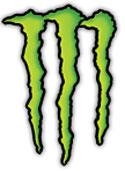 A barrage of new products introduced a couple of months ago have already contributed to Monster Beverage’s bottom line in the form of positive third quarter financials. Profit in the quarter was $299 million, or about $0.55 a share, up 10 percent from $268 million ($0.48 a share) a year ago. The Monster Energy unit (i.e., Monster Energy drinks and Reign Total Body Fuel energy drinks) led the growth, turning in net sales of $1.06 billion, an increase of 13.5 percent from $935 million last year. Strategic Brands sales – including products acquired from Coca-Cola – slid 11 percent to $66.3 million from $74.4 million. Monster added Monster Mule Ginger Brew, Reign Orange Dreamsicle, Monster Maxx Mango Magic, and sugar-free Monster Maxx Rad Red extra strength in September, along with Java Monster Farmer’s Oats coffee drink, and two Reign flavors. During a November 7 analyst conference call, CEO Rodney Sacks said the new product pipeline will not be slowing down anytime soon.[Image Credit: © Monster Energy Company]
A barrage of new products introduced a couple of months ago have already contributed to Monster Beverage’s bottom line in the form of positive third quarter financials. Profit in the quarter was $299 million, or about $0.55 a share, up 10 percent from $268 million ($0.48 a share) a year ago. The Monster Energy unit (i.e., Monster Energy drinks and Reign Total Body Fuel energy drinks) led the growth, turning in net sales of $1.06 billion, an increase of 13.5 percent from $935 million last year. Strategic Brands sales – including products acquired from Coca-Cola – slid 11 percent to $66.3 million from $74.4 million. Monster added Monster Mule Ginger Brew, Reign Orange Dreamsicle, Monster Maxx Mango Magic, and sugar-free Monster Maxx Rad Red extra strength in September, along with Java Monster Farmer’s Oats coffee drink, and two Reign flavors. During a November 7 analyst conference call, CEO Rodney Sacks said the new product pipeline will not be slowing down anytime soon.[Image Credit: © Monster Energy Company]
Nestle
Nestlé Waters Goes From Global To Regional In Switch To “Local” Focus
 In a move that reflects a strategic decision to back away from low-margin businesses and focus on premium brands, struggling Nestlé Waters group will no longer be a global business unit, but will be parked under Nestlé's three regional units (the Americas, Asia, Oceania & sub-Saharan Africa and Europe, Middle East & North Africa). Nestlé Waters, which will soon launch a water dispenser system known as Refill Plus, is "now at a stage where local responsiveness and competitiveness are of increasing importance." In addition, a “strategic business unit" will be created to align the unit globally and manage core global functions, Nestlé said. The shake-up is part of an overall restructuring at Nestlé, announced last month that includes a stronger emphasis on sustainability. CEO Mark Schneider said 60 percent of Nestlé Waters’ bottled water business comprises local brands. "These need to be managed with local relevance in mind." [Image Credit: © Nestlé Waters North America Inc.]
In a move that reflects a strategic decision to back away from low-margin businesses and focus on premium brands, struggling Nestlé Waters group will no longer be a global business unit, but will be parked under Nestlé's three regional units (the Americas, Asia, Oceania & sub-Saharan Africa and Europe, Middle East & North Africa). Nestlé Waters, which will soon launch a water dispenser system known as Refill Plus, is "now at a stage where local responsiveness and competitiveness are of increasing importance." In addition, a “strategic business unit" will be created to align the unit globally and manage core global functions, Nestlé said. The shake-up is part of an overall restructuring at Nestlé, announced last month that includes a stronger emphasis on sustainability. CEO Mark Schneider said 60 percent of Nestlé Waters’ bottled water business comprises local brands. "These need to be managed with local relevance in mind." [Image Credit: © Nestlé Waters North America Inc.]
Other Companies
South Korean Confectioner To Launch Mineral Water Into China
South Korean confectioner Orion, best known for the chocolate snack Choco Pie, plans to launch its first mineral water product, Jeju Yongamsu, this month in South Korea and then in China in the first half of next year. It will be priced at the upper-middle level in the price range of bottled mineral water sold in China, the company said. The mineral water is naturally filtered through 400,000-year-old basalt, making it rich in minerals such as calcium and magnesium. Orion has signed a contract with Chinese coffee chain Luckin Coffee, which operates about 3,000 stores nationwide, to supply it with 530 ml bottles of the mineral water, as well as snack products. Orion also plans to export the mineral water to Vietnam.
Super Coffee Avoids The Sugary Coffee Trend, Instead Delivers Protein-Rich Energy
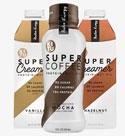 Jim, Jake and Jordan DeCicco founded Super Coffee in 2015 to deliver a healthy, protein-rich, energizing RTD coffee as an alternative to popular high-sugar and high-calorie offerings. Their bottled Super Coffee line includes original, vanilla, hazelnut and mocha. Each 12-ounce bottle contains 80 calories, 10 grams of protein, 200 mg of caffeine, five grams of fat, and one gram of carbs. They source organic Colombian coffee and blend with whey protein concentrate, coconut MCT oil and monk fruit. They have expanded their portfolio with Super Creamers in original, vanilla and hazelnut and super espresso cans in Original, Vanilla and Caramel. The products can be purchased on the company website and at nationwide retailers like Target, Whole Foods, CVS and Meijer, primarily concentrated on the east coast. The brothers claim their New York-based company is the top independent coffee company in the U.S.[Image Credit: © KituSuperCoffee]
Jim, Jake and Jordan DeCicco founded Super Coffee in 2015 to deliver a healthy, protein-rich, energizing RTD coffee as an alternative to popular high-sugar and high-calorie offerings. Their bottled Super Coffee line includes original, vanilla, hazelnut and mocha. Each 12-ounce bottle contains 80 calories, 10 grams of protein, 200 mg of caffeine, five grams of fat, and one gram of carbs. They source organic Colombian coffee and blend with whey protein concentrate, coconut MCT oil and monk fruit. They have expanded their portfolio with Super Creamers in original, vanilla and hazelnut and super espresso cans in Original, Vanilla and Caramel. The products can be purchased on the company website and at nationwide retailers like Target, Whole Foods, CVS and Meijer, primarily concentrated on the east coast. The brothers claim their New York-based company is the top independent coffee company in the U.S.[Image Credit: © KituSuperCoffee]
Stressed Jones Soda Turns TO CBD To Reinvigorate Its Business
.jpg&width=125&height=125) Seattle-based Jones Soda Co. has been accumulating red ink for twelve consecutive quarters, including a third quarter loss of $476,000 – compared to a $425,000 loss in the same period a year ago – as revenue plummeted 12 percent from $3,454,000. The company blames the decline on weakness in its partnership with 7-Eleven: revenues at Jones Soda’s private label 7-Select program dropped 48 percent in the third quarter, thanks to a decline in store-level promotions. Production issues with the Lemoncocco business also contributed to the slide. The company is now looking to cannabidiol (CBD) and a refreshed marketing strategy to regain profitability. Toronto-based hemp and CBD company Heavenly Rx invested $9 million to buy 15 million shares of Jones Soda this summer, bringing its ownership stake in the company to 25 percent. Jones Soda is using the capital to develop a line of CBD-infused beverages.[Image Credit: © JONES SODA CO.]
Seattle-based Jones Soda Co. has been accumulating red ink for twelve consecutive quarters, including a third quarter loss of $476,000 – compared to a $425,000 loss in the same period a year ago – as revenue plummeted 12 percent from $3,454,000. The company blames the decline on weakness in its partnership with 7-Eleven: revenues at Jones Soda’s private label 7-Select program dropped 48 percent in the third quarter, thanks to a decline in store-level promotions. Production issues with the Lemoncocco business also contributed to the slide. The company is now looking to cannabidiol (CBD) and a refreshed marketing strategy to regain profitability. Toronto-based hemp and CBD company Heavenly Rx invested $9 million to buy 15 million shares of Jones Soda this summer, bringing its ownership stake in the company to 25 percent. Jones Soda is using the capital to develop a line of CBD-infused beverages.[Image Credit: © JONES SODA CO.]
Dairy Company Dean Foods Files For Chapter 11 Protection
Kirin Launches Functional Yogurt-Based Probiotic Beverage In Vietnam
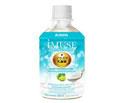 Kirin functional food brand iMUSE will market a functional probiotic yogurt and lemon-flavored beverage in Vietnam. The product contains 100 billion lactococcus lactis strain plasma which the firm claims to have immune functionality to fight infectious disease in the country. Lactococcus lactis plasma is a lactic acid bacterium and an ingredient used exclusively by the Kirin Group. According to the company, the spread of infectious diseases like dengue fever and hepatitis in Vietnam has become a serious problem. The yogurt and lemon-flavored drink is able to enhance the anti-viral immune system and maintain overall health, and can reduce the risks of cold and flu, enhance the health of skin from the inside, and reduce symptoms of fatigue in physical activity, Kirin said.[Image Credit: © Kirin Holdings Company, Limited]
Kirin functional food brand iMUSE will market a functional probiotic yogurt and lemon-flavored beverage in Vietnam. The product contains 100 billion lactococcus lactis strain plasma which the firm claims to have immune functionality to fight infectious disease in the country. Lactococcus lactis plasma is a lactic acid bacterium and an ingredient used exclusively by the Kirin Group. According to the company, the spread of infectious diseases like dengue fever and hepatitis in Vietnam has become a serious problem. The yogurt and lemon-flavored drink is able to enhance the anti-viral immune system and maintain overall health, and can reduce the risks of cold and flu, enhance the health of skin from the inside, and reduce symptoms of fatigue in physical activity, Kirin said.[Image Credit: © Kirin Holdings Company, Limited]
Wahaha
Wahaha Founder Is On A Quest To Modernize His Company
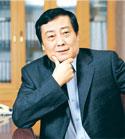 Zong Qinghou, the 74-year-old founder of China’s largest privately held beverage company Hangzhou Wahaha Group, is determined to come up with fresh product ideas and modern operational modes to rekindle consumer interest in his company. Analysts say Wahaha hasn’t kept pace with changing consumer tastes in China, where consumers are looking for beverages that are innovative and new. “Wahaha is still very price-focused, and hasn’t captured the trading-up trend as well as it could have,” says one analyst. While he concedes that Wahaha’s products was once perceived as cheap and old-fashioned, Zong says he’s working to modernize his products. The company recently launched a major upgrade of packaging and ingredients, has expanded into nutritional tablets and meal replacement biscuits, and plans to increase the current number of 6,000 distributors to 10,000 by year end. Perhaps most importantly, however, is Zong’s willingness to experiment with social media and e-commerce. He has promised to lift sales by at least 50 percent next year, to $10 billion.[Image Credit: © Hangzhou Wahaha Group Co.,Ltd.]
Zong Qinghou, the 74-year-old founder of China’s largest privately held beverage company Hangzhou Wahaha Group, is determined to come up with fresh product ideas and modern operational modes to rekindle consumer interest in his company. Analysts say Wahaha hasn’t kept pace with changing consumer tastes in China, where consumers are looking for beverages that are innovative and new. “Wahaha is still very price-focused, and hasn’t captured the trading-up trend as well as it could have,” says one analyst. While he concedes that Wahaha’s products was once perceived as cheap and old-fashioned, Zong says he’s working to modernize his products. The company recently launched a major upgrade of packaging and ingredients, has expanded into nutritional tablets and meal replacement biscuits, and plans to increase the current number of 6,000 distributors to 10,000 by year end. Perhaps most importantly, however, is Zong’s willingness to experiment with social media and e-commerce. He has promised to lift sales by at least 50 percent next year, to $10 billion.[Image Credit: © Hangzhou Wahaha Group Co.,Ltd.]
Copyright 2026 Business360, Inc.

